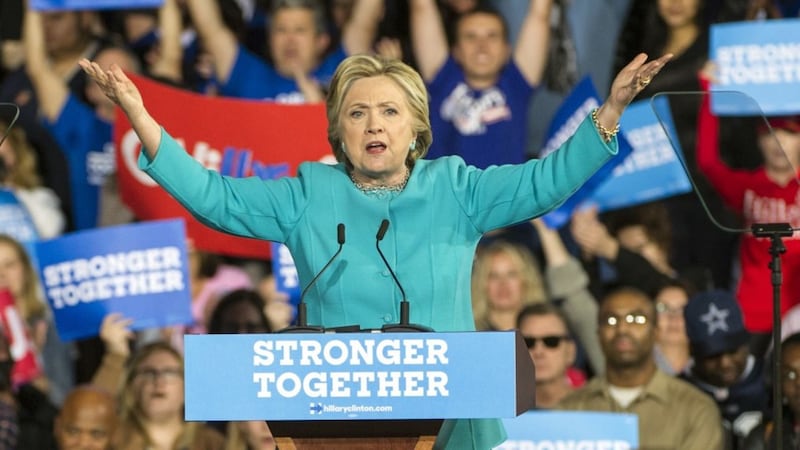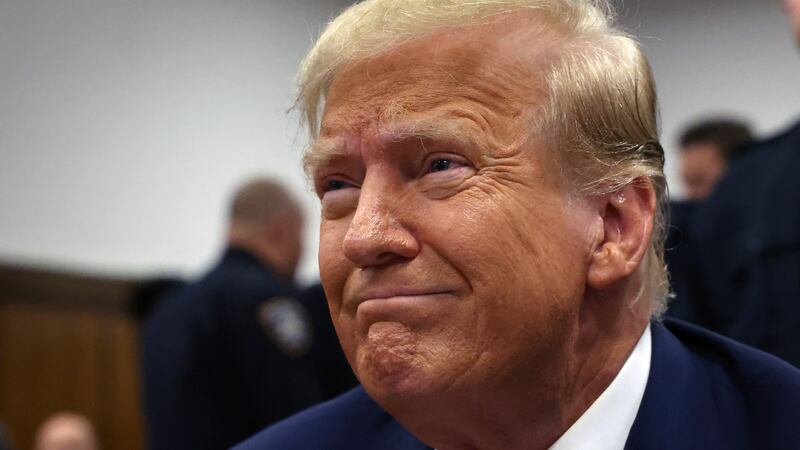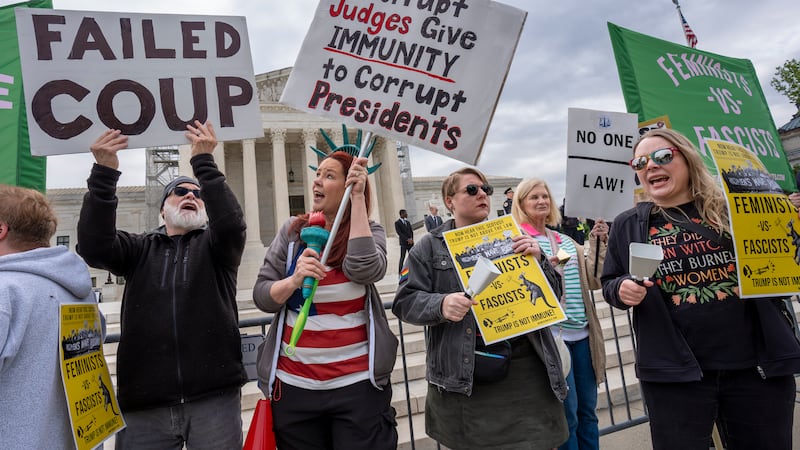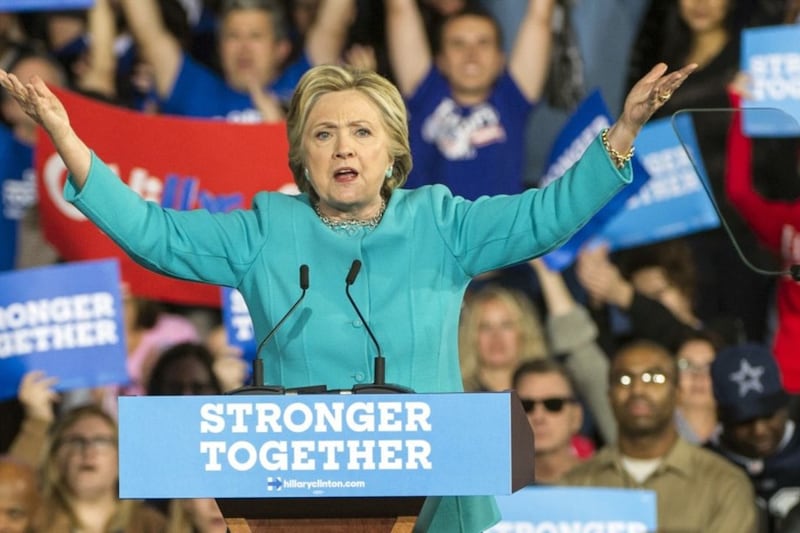In an election which pits a man accused of sexual misconduct who has no political experience and a very questionable temperament against a former US first lady and secretary of state, you’d assume there would be no contest.
But Donald Trump continues to receive support – not necessarily because of his perceived pros, but because of Hillary Clinton’s perceived cons.
Is she that bad? Why don’t people like her?
She’s ‘crooked’
Wow, just came out on secret tape that Crooked Hillary wants to take in as many Syrians as possible. We cannot let this happen – ISIS!
— Donald J. Trump (@realDonaldTrump) October 24, 2016
It’s an idea Trump has tried to hammer home at every opportunity during this election – Hillary is “crooked”.
This mostly harks back to the massive email scandal that lit up again recently, over Clinton’s use of a private email server.
Back in 2009, shortly before she was sworn in as President Obama’s secretary of state, Clinton set up a private email address that she used for work and private matters during her stay in government.
After the New York Times ran a front-page story on it in early 2015, with claims that the system “may have violated federal requirements”, she was investigated by the FBI and cleared twice. Clinton said she used a private email for “convenience” – an excuse not everybody believed.
She’s a ‘warmonger’
Clinton’s long history in politics should be an advantage, but naturally it can also be used against her.
It may seem a little odd for Republicans to criticise a Democrat for being too strong on national security, given that’s an area Republicans are generally keen to support, but Clinton’s history of encouraging military force is being spun as a negative in this election.
Clinton voted in favour of the Iraq war, something she’s since said was a mistake, but was happy to oversee around 300 drone strikes in Pakistan alone during her time as secretary of state.
There was also the coup she backed in Honduras following the now deposed president’s shift to the left.
The years Clinton has spent in government and around the military will see her in a strong position if elected President, given the conflicts America is currently involved in or supporting. But some of the biggest criticism aimed towards her is a little less direct, and centres around her support for the arms trade.
An International Business Times analysis showed that between October 2010 and September 2012 Clinton’s State department signed off on deals to sell $165 billion (£137 billion) worth of arms to 20 different governments who donated money to the Clinton Foundation. That’s almost double the amount of weapons sold during George W Bush’s second term.
What makes that even more unpalatable for many, though, is that a number of the governments Clinton has sold arms to – including Saudi Arabia, Kuwait, Oman, the UAE and Qatar – were criticised by her for either not doing enough to tackle terrorism or actively supporting it, in emails published by WikiLeaks.
And the fact that Clinton was centre-stage during a large part of the US’s busiest period selling weapons since the Second World War is also at odds with her campaign’s anti-gun image – all of which contribute to an image of her as untrustworthy.
Her role in Benghazi
Of course, one of the largest sticks used to beat Clinton concerns Benghazi, in Libya, and the death of four Americans including US Ambassador to Libya Chris Stevens, following an attack on the embassy in 2012.
Clinton took responsibility, claiming that as head of the state department she was “in charge of the state department’s 60,000-plus people all over the world, 275 posts”.
Senate reports suggested the attack could have been avoided and despite the reports barely mentioning Clinton, her earlier comments left her open to criticism.
It was actually all of this that led into the email scandal, after she was asked to hand her correspondence regarding Benghazi to the investigation.
Her ties to Wall Street
Honest question for @HillaryClinton supporters.
Why do YOU think she refuses to release the transcripts from her speeches to Wall Street?
— Shaun King (@ShaunKing) March 17, 2016
Another criticism regularly aimed at Clinton is that she’s the continuation of the “status quo”. Someone who’s been part of the established order for so long will hardly be able to shake things up, is how the argument goes. It becomes more effective with Trump on the opposite side.
A large part of this comes down to Clinton’s ties to Wall Street, a subject Bernie Sanders zeroed in on during the primaries. Wall Street, America’s economic centre, has always been a large donor to political parties. And they’ve long been an ally of the Clintons.
In the 90s and 2000s that was less of an issue than it is now, following the 2008 financial crash. Three of Clinton’s five biggest individual donors this election cycle have been Goldman Sachs, Citibank, and JP Morgan – and the thinking goes that political donors don’t give anything away for free. Her ties to Wall Street, for her detractors, mean she’ll be unable to reform Wall Street.
Clinton denies that her relationship with Wall Street has ever affected her politics.
“You will not find that I ever changed a view or a vote because of any donation that I ever received,” she said during a debate.
Further controversy comes from Clinton’s acceptance of huge sums of money to give speeches for Wall Street, excerpts of which have been published by WikiLeaks.
Those transcirpts also feed into her “warmonger” image, given how different the comments she makes in a speech to CEOs are to what she said during the Democratic primaries on, for instance, no-fly zones in Syria.
Her take on prisons
"Hillary Clinton isn't afraid to say black lives matter…" – Lucy McBath, mother of Jordan Davis pic.twitter.com/kXXjsuCdgn
— Wesley Lowery (@WesleyLowery) July 27, 2016
Clinton has the overwhelming support of the African American community, not just because she’s the Democratic candidate but because she’s a Clinton.
When her husband Bill was president, he was so popular among the black community that Toni Morrison labelled him “the first black President”. Despite Bernie Sanders’ policies being closer to the goals of the likes of Martin Luther King, Malcolm X or the Black Panthers, Hillary Clinton was still the more popular candidate among voters during the primaries. That’s not to say she avoids suspicion.
It could be because Bill escalated the war on drugs – a racially skewed war – to a level Richard Nixon and Ronald Reagan couldn’t even reach. Hillary supported him. He was the champion of the “three strikes” law that disproportionately affects black people. Incarceration rates during his presidency for the first time saw America gain the unwanted title of ‘home to the world’s largest population of prisoners’.
Hillary Clinton has now promised to put an end to private prisons, despite receiving plenty of donations from the industry during this election cycle.
She’s promised to end the mass incarceration championed by her husband, with justice system reform – but her ties to the industry mean even they aren’t worried about that.
She’s ‘literally Satan’
Alex Jones: Hillary Is Possessed By The Devil, ‘Vote Trump If You Want To Live’ https://t.co/nMB6XAwLWn
— Stop Making Sense (@sensemakingstop) October 10, 2016
The campaign against Clinton led by the “alt-right” has become increasingly exaggerated, straying over into conspiracy in plenty of spots along the way. One claim, sung loudest by Infowars’ Alex Jones, and even addressed by President Obama, is that Clinton is literally the devil. Apparently she smells of sulphur and everything.
And if she’s not the devil, she’s been connected to something weird called “spirit cooking”.
While these claims can be largely laughed at by most people, there are plenty of Trump supporters willing to agree with them. It’s even got to the stage where WikiLeaks (admittedly less than bipartisan during the election) have published “proof” of her link to Satanic rituals.
People who believe this are definitely at the top end of those who don’t like Hillary – but for the reasons listed above, plenty of regular people will either not be voting for her, or voting for her begrudgingly. It could result in a tighter election than many people are expecting.





